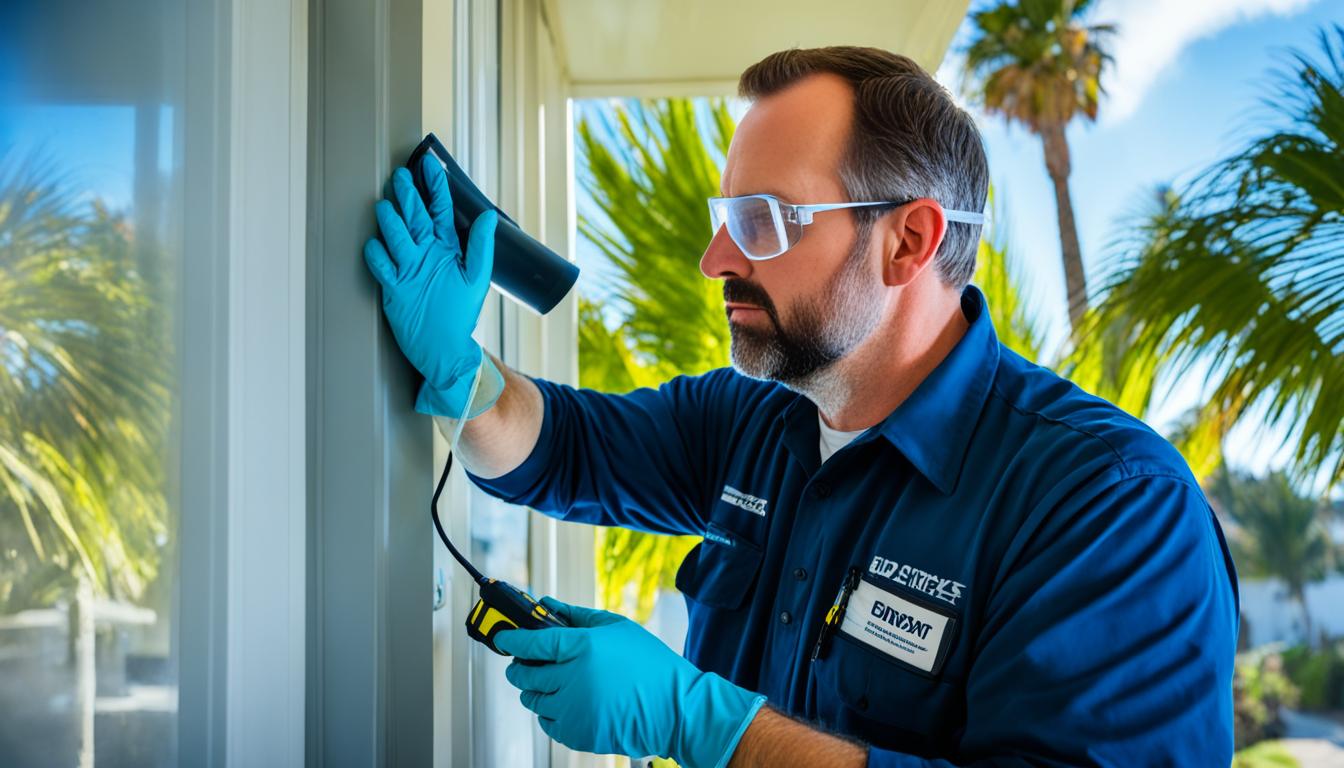
Florida Mold Assessment Guidelines Explained
Living in a safe and healthy environment is essential for everyone. Mold growth in homes and buildings can pose significant risks to our well-being. That’s why the state of Florida has established comprehensive guidelines to regulate mold assessments and ensure the protection of its residents.
Florida has stringent regulations and requirements for mold assessments, which are vital in identifying and addressing mold issues promptly and effectively. These guidelines outline the protocols that professionals must follow when conducting mold inspections to guarantee accurate results and appropriate remediation strategies.
In this article, we will delve into the mold assessment guidelines set forth by the state of Florida. We will explore the regulations, requirements, and protocols that mold assessors adhere to in order to maintain safe living environments and prevent potential health hazards stemming from mold growth.
Key Takeaways:
- Florida has implemented guidelines to regulate mold assessments and promote safe living environments.
- Understanding the regulations and requirements is crucial for professionals conducting mold inspections.
- The guidelines ensure accurate results and effective remediation strategies.
- Adhering to these guidelines helps in identifying and addressing mold issues promptly.
- Maintaining safe living environments is essential for the well-being of property owners and occupants.
Mold Assessment Process in Florida
When it comes to conducting a mold assessment in Florida, following the proper protocols and guidelines is essential to ensure accurate results and effective remediation. In this section, we will provide a comprehensive overview of the step-by-step process involved in assessing mold in properties across the state.
1. Initial Inspection
The first step of the mold assessment process is conducting a thorough initial inspection of the property. A certified mold assessor will examine the affected areas and assess the extent of mold growth and damage. This inspection helps in identifying the source of moisture, which is essential for mold development, and determining the necessary remediation actions.
2. Sample Collection
During the assessment, the mold assessor will collect samples to analyze the presence and concentration of mold spores in the air and on surfaces. This sampling process helps in identifying the specific types of mold present and their potential health risks. The samples are carefully collected following established guidelines and using appropriate equipment to ensure accurate and reliable results.
3. Laboratory Testing
Once the samples are collected, they are sent to a certified laboratory for analysis. The laboratory testing assesses the type and concentration of mold spores present in the samples. The results provide valuable information for determining the severity of the mold infestation and guiding the remediation process.
4. Assessment Report
Based on the findings from the initial inspection and laboratory testing, the mold assessor will prepare a detailed assessment report. This report includes information about the extent of mold growth, potential health risks, and recommended remediation actions. It serves as a comprehensive guide for property owners and remediation professionals to address the mold issue effectively.
5. Remediation Plan and Clearance Testing
After receiving the assessment report, a certified mold remediation company can develop a customized remediation plan. This plan outlines the specific steps and strategies to safely remove the mold and prevent further growth. Once the remediation is complete, the mold assessor will conduct clearance testing to ensure that the property is free from mold and meets the Florida mold testing standards.
By following the mold assessment protocol guidelines and adhering to the best practices in Florida, mold assessors play a crucial role in creating healthier living environments for property owners and occupants. The certification process for mold assessors ensures that they have the knowledge, skills, and expertise to carry out assessments effectively.
Next, we will conclude our exploration of the Florida mold assessment guidelines, summarizing the main points discussed and emphasizing the importance of proactive mold assessments in maintaining safe and habitable properties.
Conclusion
In conclusion, adhering to the mold assessment guidelines in Florida is crucial for ensuring the safety and well-being of individuals living in properties affected by mold. By following the proper procedures and protocols outlined by the state, mold assessors and remediation professionals can effectively identify and address mold issues, providing peace of mind to property owners and occupants alike.
If you suspect mold growth in your property, it is highly recommended to contact a certified mold assessment professional in Florida for a thorough assessment and appropriate remediation measures. These professionals have the expertise and knowledge to conduct comprehensive mold assessments, determining the extent of the problem and recommending the most suitable solutions.
Taking a proactive approach to mold assessments is vital in creating healthier living environments. Detecting and addressing mold issues early on can prevent further damage, maintain indoor air quality, and safeguard the health of occupants. Don’t hesitate to reach out to qualified professionals who can guide you through the mold assessment procedure in Florida and ensure your property remains safe and mold-free.




